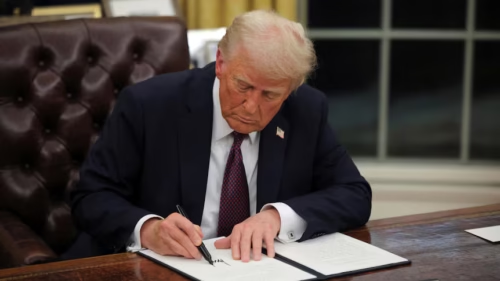
During the era of zero-interest rates in the U.S., venture capital firms invested heavily in emerging markets, including Africa, seeking high returns. However, the recent suspension of U.S. trade tariffs for 90 days could lead to significant changes for African markets. If tariffs resume, they may disrupt non-oil export volumes, create unstable exchange rates, and fuel inflation.
This potential disruption could cause investors to adopt a “wait-and-see” strategy, leading to pullbacks from African markets, particularly affecting sectors such as e-commerce, logistics, agriculture, fintech, and technology, industries where many Nigerian startups operate.
“The uncertainty could lead to a slowdown in investments into African startups as potential investors reevaluate the risks,” said Temitope Omosuyi, a UK-based investment analyst. “The effects will likely impact sectors like logistics and cross-border payments.”
In March 2025, the African tech ecosystem saw one of its lowest funding months since late 2020, with only $50 million raised, according to Africa: The Big Deal. Venture capital funding in the first quarter of 2025 also dropped 5%, from $486 million last year to $460 million, with investments in Nigeria remaining steady at $410 million in 2024, the lowest since 2021.
Maya Famodu, partner at Ingressive Capital, a pan-African venture fund, explained that higher tariffs lead to inflation, and with the economic situation in the West, she expects a recession. “Recession means a buyers’ market, and a more cautious investment approach for U.S.-based investors, which is unfavorable for Africa,” she said.
However, Tayo Oviosu, CEO of Paga, views the situation differently. He believes that while global capital flows may shift, the tariffs could ultimately spark more investor interest in African startups. “With the stock market decline, now may be an ideal time to invest in private markets,” he said.
Despite the looming uncertainties, Nigerian exporters remain optimistic. Under the African Growth and Opportunity Act (AGOA), Nigerian exports enjoy duty-free access in sectors like agriculture and manufacturing. Non-oil exports surged by over 250% in 2024, reaching ₦309.1 billion ($196.6 million), up from ₦86.4 billion ($54.9 million) in 2023.
For smaller e-commerce businesses, the impact of new tariffs is immediate. For instance, a $100 shipment of cassava flour now carries a $14 duty, potentially cutting margins or raising prices. Luther Lawoyin, CEO of PricePally, a Nigerian grocery startup, believes the impact will be temporary. “The growing demand for staples and the naira’s depreciation will help businesses adjust quickly,” he said.
Similarly, Malobi Ogbeche, founder of KadanKadan, a group cargo export platform, sees the uneven tariff structure as an opportunity. With Nigeria’s 14% tariff lower than competitors like Thailand (46%) or Vietnam (49%), Nigeria may be well-positioned to offer competitive prices in the global market.
While Nigeria’s goods remain affordable globally, turning raw materials into finished products faces challenges. The country lacks sufficient factories, and unreliable power supply hinders growth. “We can build that capacity,” said Ogbeche, though chronic underfunding may delay progress.
The African Continental Free Trade Area (AfCFTA) has faced difficulties in reducing tariffs within Africa, which remains a major barrier to intra-African trade. Omowumi Omidiji, founder of Souq OS, a supply chain platform, suggests that Nigerian exporters could leverage Africa’s lower tariffs to route products through the continent, ensuring competitive shipping costs.
At the same time, disruptions in global trade may present opportunities for stablecoins. While the crypto market has experienced a downturn, Francis Ogbuka, VP of sales at blockchain company Zone, suggests that the U.S.-China trade tension could open new trade corridors for Africa. “Blockchain and stablecoins offer real-world utility by solving cross-border payment challenges and improving foreign exchange liquidity,” he added.
The telecom industry, largely dependent on imported equipment, may not be directly affected by export tariffs. However, indirect impacts could emerge due to changes in foreign exchange earnings, inflation, and shifts in consumer spending patterns.
“There might not be direct effects, but the broader economic disruptions could make it harder for telecom operators to manage rising costs,” said Gbenga Adebayo, President of the Association of Licensed Telecommunication Operators of Nigeria (ALTON).
Despite the temporary pause on tariffs, for Nigerian startups, this serves as a reminder that global trade dynamics can have local consequences. From rising operational costs to a cautious investor landscape, the ripple effects of these global shifts are significant.



